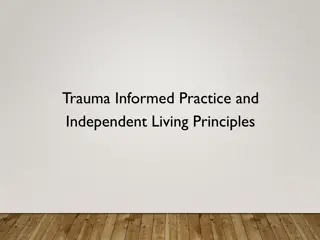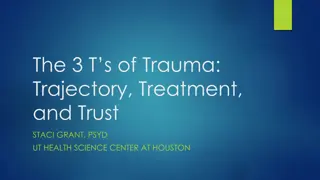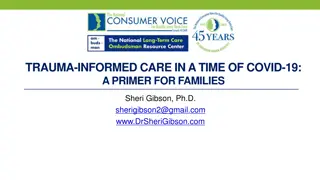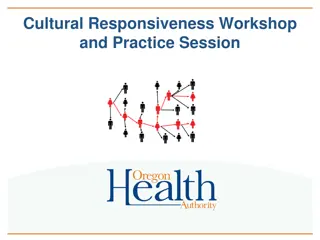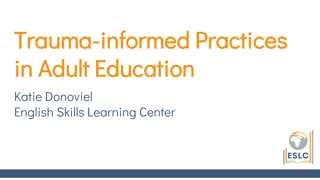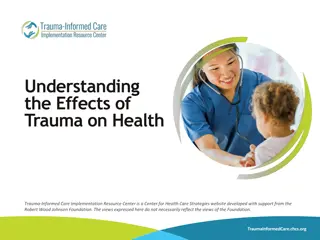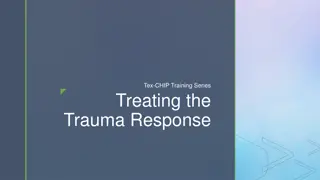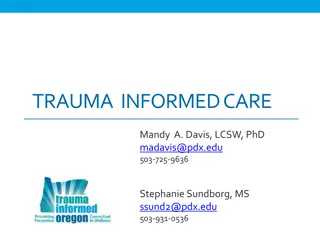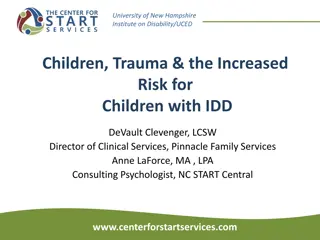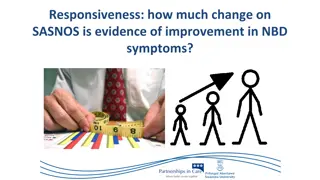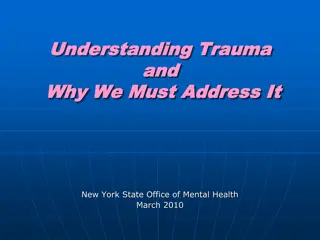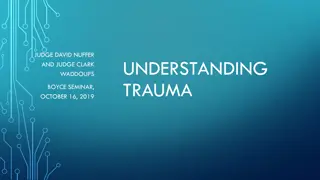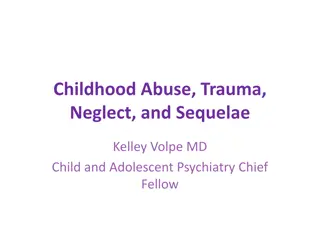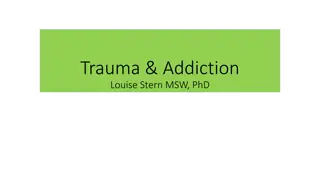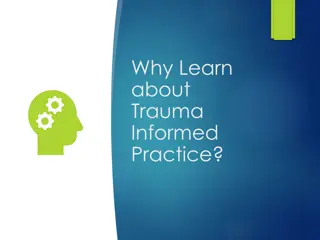Understanding Cultural Responsiveness and Historical Trauma
Cultures shape interactions and behaviors, influencing individuals profoundly. Cultural responsiveness, exemplified by cultural humility, involves self-evaluation, rectifying power imbalances, and fostering alliances. Historical trauma impacts marginalized groups, perpetuating cycles of self-hatred and negative behaviors. Recognizing these dynamics is crucial for promoting healing and understanding in diverse communities.
Download Presentation

Please find below an Image/Link to download the presentation.
The content on the website is provided AS IS for your information and personal use only. It may not be sold, licensed, or shared on other websites without obtaining consent from the author. Download presentation by click this link. If you encounter any issues during the download, it is possible that the publisher has removed the file from their server.
E N D
Presentation Transcript
For the trainer: Please note this slide deck is not a train the trainer presentation with fully developed scripts and exercises. These slides and accompanying notes are offered as suggestions. Slides may be used separate from the slide deck and in a different order than how they are currently presented. If slides are used, please use the citation below and maintain all original citations found on the slides. National Council for Behavioral Health. Fostering Resilience and Recovery: A Change Package for Advancing Trauma-Informed Primary Care. 2019.
Trauma in the Context of Culture
"Culture is the communication and interaction guide of a group of individuals" -Sockalingam, 2019
Culture The shared values, traditions, arts, history, folklore, and institutions of a group of people that are unified by race, ethnicity, nationality, language, religious beliefs, spirituality, socioeconomic status, social class, sexual orientation, politics, gender, age, disability, or any other cohesive group variable. -Singh, 1998
Cultural Responsiveness Cultural Humility is another way to understand and develop a process-oriented approach to competency. The ability to maintain an interpersonal stance that is other-oriented (or open to the other) in relation to aspects of cultural identity that are most important to the [person] Hook et al, 2013 Three factors guide a person toward cultural humility: 1) Lifelong commitment to self-evaluation and self-critique 2) Desire to fix power imbalances where none ought to exist 3) Aspiring to develop partnerships with people and groups who advocate for others -Tervalon & Murray-Garcia, 1998
Historical Trauma Who is Impacted by Historical Trauma American Indians/First Nations Peoples Immigrants People of Color (including African-Americans/Blacks) Families Living in Poverty Manifestations of Historical Trauma People may begin to internalize the views of the oppressor and perpetuate a cycle of self-hatred that manifests itself in negative behaviors Emotions such as anger, hatred, and aggression are self-inflicted, as well as inflicted on members of one s own group
Immigrant Children 1 in 4 children in the US lives in an immigrant family (18.4 million children) 30% of immigrant children live below the FPL compared to 19% of US-born children Immigrant children are 2x more likely to be uninsured Non-citizen populations access mental health services only 0.1 times a year Undocumented children have even greater externalizing problems than US-born or immigrant children with legal documentation Diana MTK Autin, Strengthening immigrant children's mental health: together we can! Juntos, Podemos! [Power Point slides]. Retrieved from: https://www.state.nj.us/njsncc/documents/presentation/d_au tin_strength_immigrant_children_mh.pdf
Serving Immigrant Children Immigrant children may have traumatic experiences prior to reaching the US May have been separated from family members for extended periods May have lost family members due to violence, famine, etc., in their country of origin May have personally faced poverty, hunger, drought, violence, sexual trafficking, exposure to war, natural disasters May not have had access to medical or mental health care prior to arriving in the US Parent more likely to be low-income even if they were professionals in their country of origin More likely to live in sub-standard conditions Diana MTK Autin, Strengthening immigrant children's mental health: together we can! Juntos, Podemos! [Power Point slides]. Retrieved from: https://www.state.nj.us/njsncc/documents/presentation/d_autin _strength_immigrant_children_mh.pdf
Historical Trauma Perpetuated Today Microaggressions are everyday experiences of discrimination, racism, and daily hassles that are targeted at individuals from diverse racial and ethnic groups (Evans-Campbell, 2018). Health disparities, substance abuse, and mental illness are all commonly linked to experiences of historical trauma (Michaels, Rousseau, and Yang, 2010). https://www.youtube.com/watch?v=sjJUQlodh0g
Culturally-Sensitive Trauma-Informed Care Helping to restore a sense of safety for the child and family through trust-building Working within and through the family structure to promotion emotional and social support and utilization of coping resources Recognizing cultural variation in the subjective perception of trauma and traumatic stress responses Understanding the role of beliefs in the interpretation of trauma and the recovery process Attending to the distress of the child or family, in the way that THEY define it Culturally-Sensitive Trauma-Informed Care. (n.d.). Retrieved from https://www.healthcaretoolbox.org/cultural-considerations/culturally- sensitive-trauma-informed-care.htmltext
Culturally-Sensitive Trauma-Informed Care. (n.d.). Retrieved from https://www.healthcaretoolbox.org/cultural- considerations/culturally-sensitive-trauma-informed-care.html
Culturally-Sensitive Trauma-Informed Care. (n.d.). Retrieved from https://www.healthcaretoolbox.org/cultural- considerations/culturally-sensitive-trauma-informed-care.html
Jordan Erikson, Cultural communication, retrieved from: jordanerickson@weebly.com





